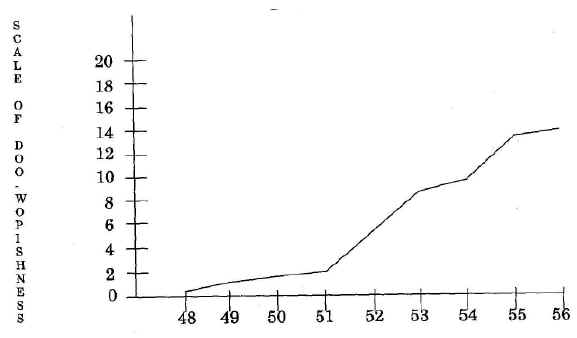
"Doo-wop music evolved slowly, unlike rockabilly which seemed to explode onto the
scene in the 1955-1956 period. Between 1948 and 1951 the doo-wop characteristics of
nonsense syllables and falsetto began to emerge in songs such as "It's Too Soon To
Know" by the Orioles, "Count Every Star" by the Ravens, "Harbor
Lights" by the Dominoes, and even in the immensely popular "Sixty-Minute
Man," also by the Dominoes. That is not to say that these songs were even mostly
doo-wop style; their backgrounds show that they are still oriented to jazz (Ravens) or
rhythm and blues (Dominoes). By the period 1952-1954, however, a significant number of
doo-wop characteristics can be discerned in slow songs by the Five Keys, Feathers,
Orioles, And Vocaleers, and in fast song by the Chords, Crows, Drifters, and Shirley
Gunter & the Queens. We labeled the style of this era "paleo-doo-wop," since
the prefix "paleo-" means ancient, early or primitive.
Instrumentation, vocal arrangement and overall "feel" of paleo-doo-wop was still
based in r&b and other progenitors. For example, the influence of r&b can be heard
in "Hey, Baby Doll" by the Clovers and "Money Honey" by the Drifters.
Gospel techniques are heard in such songs as "Heavenly Father" by the Castelles
and
"The Bells Of St. Mary's" by Lee Andrews and the Hearts, and the influence of
black popular vocal group harmony is found in "Foolishly" by the Three Chuckles
and "Only You" by the Platters.
The changes that signaled the dawn of the doo-wop era were the appearances of blow
harmonies and nonsense syllables, the use of falsetto to "run over" the lead
(especially in ballads), and the punctuation of choruses by bass (especially in jump
tunes). Lead singers in paleo-doo-wop were cut from the silky tenor mold of Clyde
McPhatter of the Drifters and Rudy West of the Five Keys. Melisma was employed frequently,
especially in ballads. Subject matter was at times suggestive in up tempo numbers, as it
had been in rhythm and blues. The primary theme of classical doo-wop, namely innocent
love, began to emerge here (as in such songs as "Gee" by the Crows and "Be
True" by the Vocaleers). Many of the girls addressed by paleo-doo-woppers had already
"done it," while those glorified in later stages were waiting for the church
bells to ring."

Prominent Examples of the Paleo-Doo-Wop Era:
| Group | Song - You Tube | Tempo | Year |
| Cadillacs Chords Clovers Crows Diablos Drifters Five Keys Harptones Hearts Jewels Meadowlarks Medallions Moonglows Orioles Penguins Rivileers Robins Wrens |
Gloria Sh-Boom One Mint Julep Gee The Wind Honey Love Out Of Sight, Out Of Mind A Sunday Kind Of Love Long Lonely Nights Hearts Of Stone Heaven and Paradise Buick 1959' In My Diary Crying In The Chapel Earth Angel A Thousand Stars Smokey Joe's Cafe Come Back My Love |
Slow Fast Medium Fast Slow Fast Slow Slow Slow Fast Slow Fast Slow Slow Slow Slow Medium Fast |
1954 1954 1954 1954 1954 1954 1956 1953 1957 1954 1955 1954 1955 1953 1954 1954 1955 1955 |